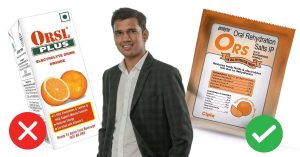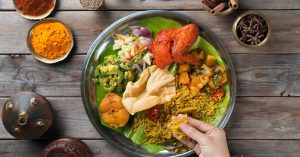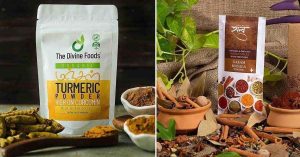Too Much Sugar in ‘Cerelac’! Guide On How To Design a Healthy Food Plan For Your Baby
A recent report found that Nestle adds almost 2.7g of sugar in baby food like Cerelac in India. We spoke to experts to help young parents feed balanced and nutritious meals to babies and toddlers.
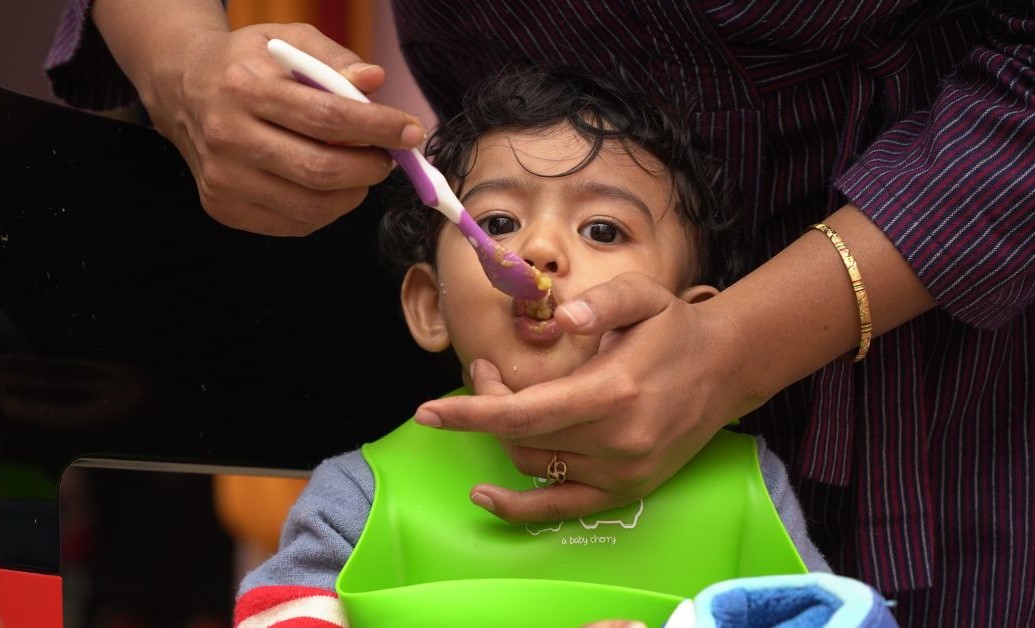
When your baby turns six months of age, it signifies a major milestone. It is the time for them to start solid foods, with most cultures having a ceremony to mark the occasion.
Celebrations aside, the weeks leading up to this milestone are filled with great confusion as parents read books, speak to family and friends, watch videos and consult doctors/nutritionists about what they should offer to the child first.
As a mother to a 15-month-old, I wonder what to feed my toddler daily and how to give him a balanced diet. Our anxiety increases when we see a variety of opinions from different doctors and nutritionists.
However, numbers don’t lie and the rising obesity amongst children today underscores the need for the right nutrition for children.
In the era of quick commerce and fast food, one might be tempted to buy packaged food and purees like cerelac for babies.
However, a new report has unearthed shocking facts. A report published by the Swiss organisation Public Eye, and the International Baby Food Action Network (IBFAN), found that Nestle, the Swiss multinational food company, adds more sugar in infant food products in lower-income countries, including India.
The report states that its infant cereal Cerelac, intended for babies from the age of 6 months, contained 2.7 grams of added sugar per serving in India. The same Cerelac contains no added sugar in the UK and Germany.
But why is this important?
India is seeing a rising trend in childhood obesity, with 43 lakh children in the 0-5 age group identified as obese or overweight in 2023, according to a report in The Hindu.
The World Health Organisation (WHO) recommends that no added sugars or sweetening agents should be used in food for children under the age of three to reduce the risk of obesity.
Packaged food items like Cerelac typically provide an easy option for parents and have been used for decades in India. Over the past few years, doctors have stopped recommending such cereals and instead ask parents to provide homemade healthier alternatives.
So what do you offer your babies when they start solids; and later, to your picky toddlers?
The Better India spoke to paediatricians and nutritionists to answer these burning questions.
Which solid food should you introduce first to your baby?
First things first, you must start solids for your baby only at six months of age and not earlier, say experts.
When you start solids, breast milk or formula remains the primary source of nutrition.
“The idea is to let babies try a wide variety of foods slowly and introduce them to varied tastes. Start with single ingredients and give each food item for three days. You could give carrots, apples, bananas or papayas in pureed and mash forms. You can slowly introduce ragi, rice porridges, and moong, masoor and toor dal,” says Vidhya Ramasubramanian, Head, Department Of Nutrition at the SMSIMSR (Sri Madhusudan Sai Institute of Medical Sciences and Research).
Start by replacing one meal a day, preferably breakfast, and slowly introduce the second meal. Don’t fret if your baby just eats one or two spoons in the beginning. It’s not about them finishing the bowl, the idea is to teach your baby to eat food and enjoy it, stresses Vidhya.
Here’s a sample meal plan for a toddler by Vidhya Ramasubramanian-
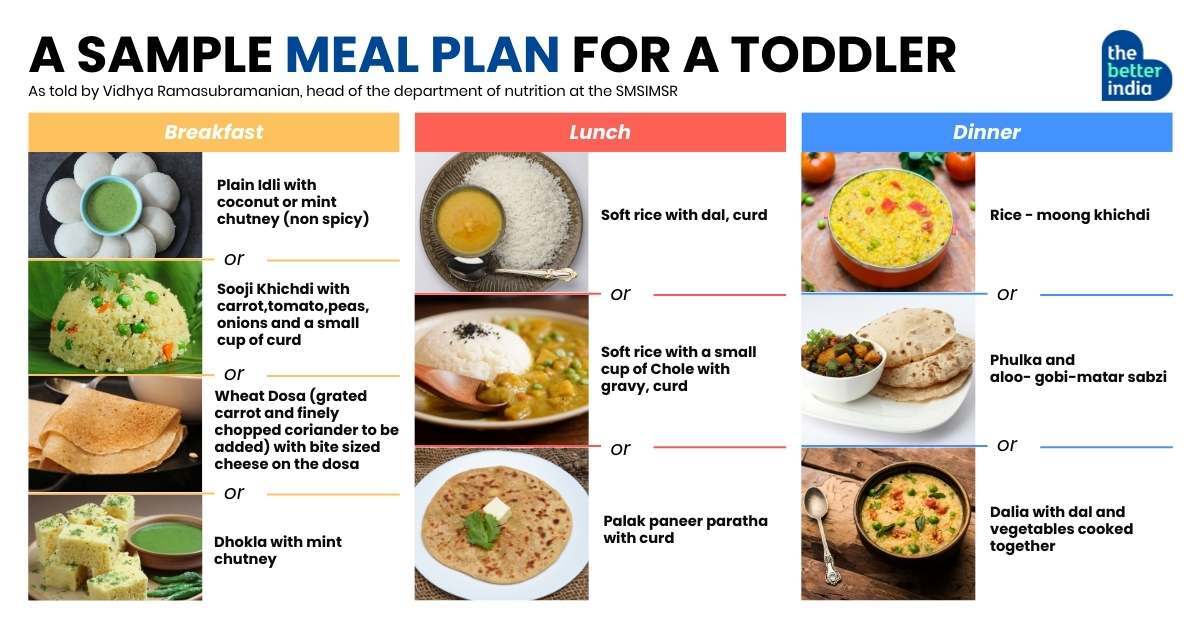
No screens while eating
Dr Vikram Gagneja, the Head of Department, Paediatrics And PICU (Paediatric Intensive Care Unit), Manipal Hospital, Dwarka, says that the most important thing is to model healthy eating habits.
Whenever we eat at hotels, we notice children eating with a video playing in front of them. This is a potentially harmful habit, explains Dr Gagneja.
“Children see us as role models. We need to stop eating in front of a screen and stop feeding children by distracting them using a TV or a mobile phone. They should see what food they are eating and develop an interest in it,” he adds.
Just like we model good behaviour, we need to model good eating habits too.
No added sugar till 2
Everyone accepts that completely restricting sugar is not possible, but experts recommend using natural sugars and sweeteners instead.
“We see so many obese children now. Sugar is extremely addictive, and if introduced at a young age, children don’t eat anything else. Fruits have natural sugars and can be used to sweeten porridge. Refined sugar is not advisable, completely avoid till one, and after that, you can use dates and jaggery,” adds Dr Gagneja.
Until one year of age, no sugar and salt should be given to babies.
To make your porridges tastier, you can add spices like jeera, asafoetida, elaichi, saffron and more; or you can add fruits to sweeten them.
“When adults are moving to low salt and sugar diets, why do kids need so much sugar and salt?” asks Dr Amit Gupta, Senior Consultant Paediatrician & Neonatologist at the Motherhood Hospital in Noida.
“Since processed food contains a lot of salt and sugar, we must avoid that while starting solids. As it is impossible to completely avoid it, it’s okay to give it once in a week to older kids,” he adds.
After one, babies should be given what the rest of the family eats, where subtle sugar and salt can be used, he adds. Encourage responsive eating and don’t force feed. Just like we regulate our intake, accept a child’s ‘no’ as well, he explains.
“Appetite is a natural phenomenon. The idea of getting the child to eat the same as the family is to prevent fussy eaters. They should get used to everything one eats regularly,” he adds.
A baby is a clean slate, and will accept anything you give. For example, when I started cow’s milk for my son after he turned one, I did not add any sugar or sweetener to it. It’s just boiled and cooled, and he loves it, since he doesn’t know any other taste.
Garima Dev Verman, a certified nutritionist and medical content analyst with The Healthy Indian Project (THIP), states that if we start a baby on the sweetened, powdered baby food at six months, he or she won’t accept anything else later.
“The amount of sugar in one serving of Cerelac is too much, which is not at all required by a baby. Sugar is addictive, leading to babies demanding only sweet foods then. You can instead use fruits which are naturally sweet,” she says.
What are the important nutrients that a baby needs?
A baby needs a balanced diet, comprising all essential nutrients. Every meal for a baby must include fats, carbohydrates and protein, says Sanchita Daswani, a nutrition consultant.
Iron and calcium are essential for a baby’s development.
“Carbohydrates and irons are very important for babies, as are fats for their brain development. Along with this, a fruit and a vegetable is equally paramount. Include ghee, nuts and seeds for fats; millets, root vegetables, dal, poha, pasta and quinoa for carbohydrates with fermented foods like idli, dosa and curd,” she says.
All the food our baby needs is available in the kitchen, adds Dr Amit Gupta. After six months, a child needs complementary food to provide the required nutrition.
“There are many recipes available to replace store-bought cerelac. We should use those instead. Give lots of pulses, nuts, green vegetables and ghee to your kids. Non-vegetarians can include broths and soups which are also excellent for babies,” he says.
For a rich source of protein, offer curd, eggs and paneer. Add nut butters and nut powders in porridges, dosas, fruits to ensure a complete meal.
Easy to make cereal mixes at home/during travel
Most experts advise parents to use millets — India’s superfoods — which are great for kids.
“You can roast makhana, rava, poha, ragi, oats and other millets, and then powder them separately. Just mix with hot water, add a fruit if you wish, and an instant porridge is ready. They are great for travel too. You can also add mango, banana, apples, berries to sweeten them,” says Divisha Jadhwani, a baby and child nutritionist.
Another good option for Indian households is sattu maavu (multigrain) mix. Most of these powders and mixes are sold by homegrown brands in case one can’t make it at home.
For snacks, you could try murmuras, makhanas, puffed rajgira, jowar puffs, ragi puffs, laddoos, and homemade cookies. All these can also be carried during travel.
Here’s a one week travel meal plan by Divisha Jadhwani-
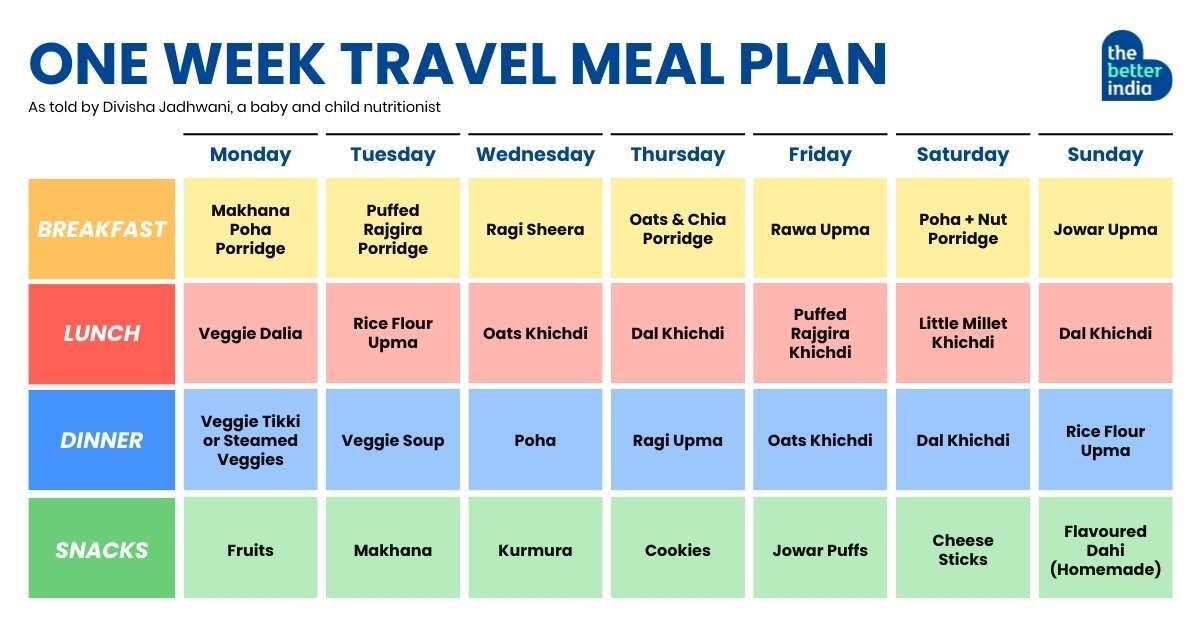
It’s time to wake up and set a good example for our kids. Prioritising nutrition and making them develop a healthy relationship with food from the get go is utmost important.
“Eat healthy, spend quality time with your children and avoid screen time as much as possible,” says Dr Gupta. If you found our stories insightful, informative, or even just enjoyable, we invite you to consider making a voluntary payment to support the work we do at The Better India. Your contribution helps us continue producing quality content that educates, inspires, and drives positive change. Choose one of the payment options below for your contribution- By paying for the stories you value, you directly contribute to sustaining our efforts focused on making a difference in the world. Together, let’s ensure that impactful stories continue to be told and shared, enriching lives and communities alike. Thank you for your support. Here are some frequently asked questions you might find helpful to know why you are contributing?

The next time you are confused about what to give your child, just remember that they too have their moods just like us. Focus on introducing them to a variety of healthy food, and try to limit their intake of sugar and processed food. Let them develop a good relationship with food by creating a conducive environment sans screens and distractions. Enjoy your baby’s milestones and don’t fret when they have their off days. Don’t we all have those too?
Edited by Padmashree Pande.
Sources-
WHO
‘43 lakh children below the age of five identified as obese or overweight: official data’ Published on 17 September, 2023. Courtesy: The Hindu
This story made me
- 97
- 121
- 89
- 167




